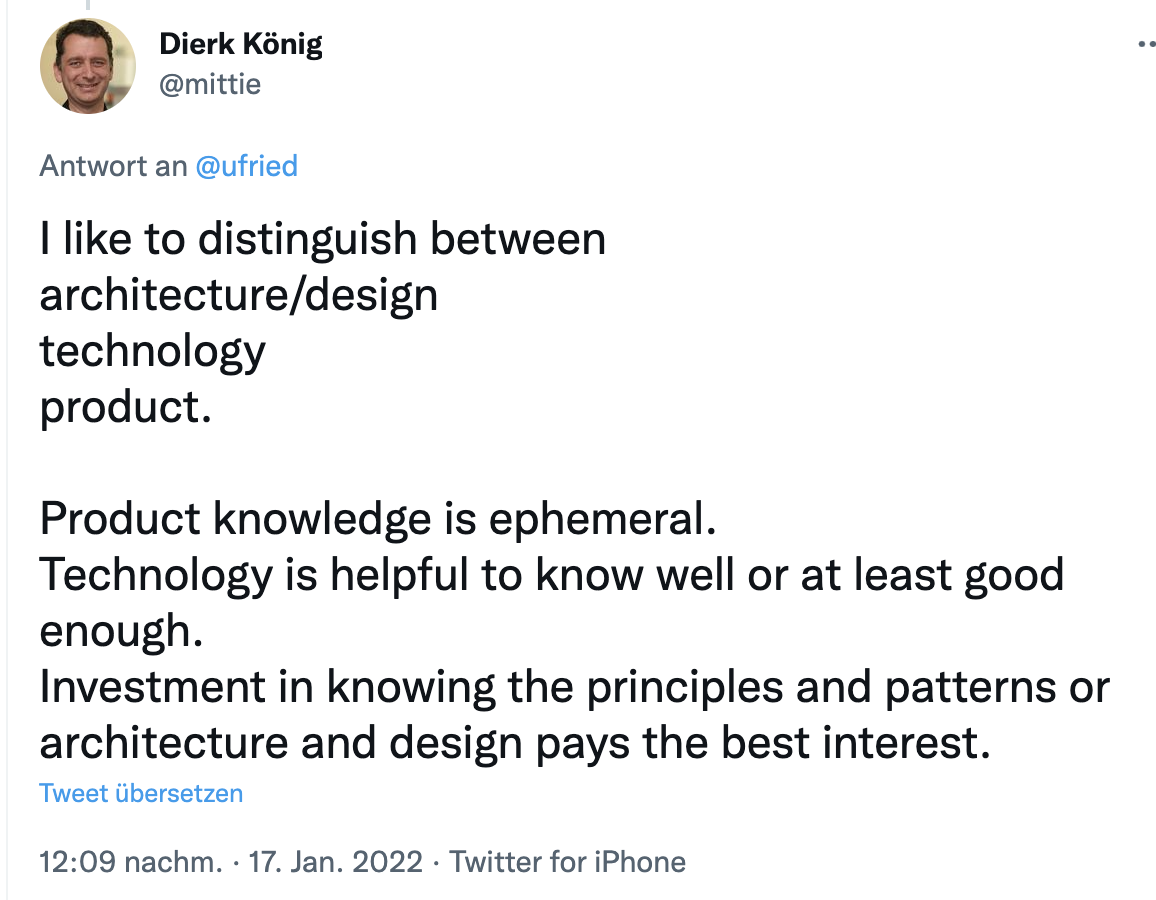Leaving the rat race - Part 6
Using your time in better ways

Leaving the rat race - Part 6
In the previous post, I gave a few recommendations how to deal with the hype industry and leave the rat race.
In this final post of this little blog series, I will add a few ideas how to use your time in a more useful way, discuss a few risks and side effects of taking this road and sum up the whole series.
Using your time better
Let us assume the recommendations of the previous post will help you to leave the rat race. This will not only result in a lot less stress, but also in more spare time. This raises the question if there are options to use some of that time to learn something more useful. 1
In the end, “useful” is – at least to a certain degree – in the eye of the beholder. Thus, as so often I cannot offer you any one-size-fits-all solutions. But the following two suggestions are IMO really useful – not only useful for you but also for the people you work with and maybe even the whole community:
- Tackle the actual problems
- Become T-shaped
Let us go through them one by one.
Tackle the actual problems
We discussed it in the third part of this blog series: All the tools, technologies and approaches that promise relief from growing complexity, crippled changeability, reduced productivity and long time-to-market duration in the end are but distractions from the actual problems that lead to the situation.
I listed some of the actual problems that lead to the aforementioned shortcomings of our IT landscapes:
- The unsolved problem of good functional design
- A lack of good architectural work
- Missing feedback loops across the (IT) value chain
- Short-term efficiency thinking
- Ignoring the needs of software
Working to alleviate one or more of those problems will create a lot more value than knowing the next and next and next hyped tool. Additionally, tackling these problems means addressing fundamental issues in IT with a long-term impact. Any energy invested in these topics will pay over and over again and not just until the next tool becomes fashionable.
Or how Dierk König, a highly appreciated community colleague put it on twitter:

And if you are successful with one of these topics, you will immediately feel how your environment will become a place more enjoyable to work at. This alone should be worth it.
Become T-shaped
You need some deep knowledge. Become an expert in whatever area you like (and consider valuable). But realize when you dug deep enough. There is a point when digging deeper does not increase your value anymore – at least with respect to the vast majority of problems in IT. 2
Then try to broaden your expertise. Learn something new. Leave your comfort zone for a while. See what other people do, what drives them, what their pain points are. You do not need to become an expert in all those topics. A basic understanding often is sufficient. But this broader knowledge will help you to see the bigger picture better which in turn will improve the decisions you will make in your area of expertise. It will also improve your collaboration abilities a lot.
And as mentioned before: There can be more than one vertical bar in the “T”. You also may become an expert in more than one area. This is up to you. But do not forget the broad knowledge. Try to build at least some of it.
Risks and side effects
These were the recommendations I have for you how to to use your time better. Before wrapping up, a few honest words regarding the “side effects” of leaving the rat race and taking such a course of action:
-
Be aware that you have a big, luring industry against you – This constant state of FOMO did not come out of nothing. There is a multi-billion Euro industry that wants you to believe you cannot afford to miss this new thing … and the next new thing … and the next new thing … and so on.
They live from it. Often, their existence depends on it. So, they will do anything to keep you in the FOMO cycle. Some days it will be easier for you to bring some distance between you and them. Other days it will be harder. 3
-
Be aware that most of your peers will be lured by that industry – Most of your colleagues and peers will be drawn into the hype industry game. If you distance yourself from that game, you might also distance yourself from your peers – or more likely they will distance themselves from you because you are no longer part of the “in-group” whose members identify by always running after the latest IT fashions.
Be prepared for that. It is normal human behavior. Try to find allies who feel like you. This may protect you from falling into a hole if your peers should not understand you anymore. 4
-
Be aware that most companies hire hyper-specialists (while actually being in desperate need of T-shaped people) – Most job ads in IT contain a long list of tools, technologies and approaches, companies expect you to be proficient in. And many personnel departments use these lists to filter applicants while pre-evaluating the incoming job applications.
Usually all those companies are in desperate need of people who know how to tackle the actual problems I described in the third post of this series. Still, they usually have not understood that it is this kind of expertise they need. Instead, they still try to address their problems using the traditional division-of-labor approach, which results in looking for ever more specialized people – for hyper-specialists.
And even if they have understood they need a different kind of expertise, they have no idea how to identify it. Thus, they tend to stick to the old way of looking for support – hiring hyper-specialists.
This means it may become less straightforward to find a new job if you do not play the hyper-specialization game. If you master this hurdle, the companies usually realize very quickly that you deliver a lot more value than the person they described in their job ad – especially if you tackle the actual problems I described and/or foster a T-shaped profile. But there may be a hurdle upfront. Be prepared for that.
This whole situation often reminds me of a famous quote, Sir Tony Hoare made in his 1980 ACM Turing award lecture “The Emperor’s Old Clothes” 5. Back then he talked about some of the experiences he made while being part of several programming language committees, some of these committees mostly being driven by the economic interests of the companies behind them:
At first I hoped that such a technically unsound project would collapse but I soon realized it was doomed to success. Almost anything in software can be implemented, sold, and even used given enough determination. There is nothing a mere scientist can say that will stand against the flood of a hundred million dollars. – Sir Tony Hoare
From what I have seen inside and outside of IT, I think this statement is quite universal. Whenever enough money is in the game, it tends to become hard to withstand the fashion the herd is following, fashions relentlessly driven by players determined to get a big share of that money.
Still I think, often it is worth to withstand, resulting in a much better work and life quality.
Summing up
We have gone quite a long way from the first post of this series to here:
- We have talked about the widespread FOMO cycle in IT, resulting from the continuous flow of “innovations you cannot afford to miss”.
- We have looked at the evolution of this cycle, the drivers behind it and the resulting hype industry.
- We have seen that there is a lot less innovation in IT than the continuous puffery suggests.
- We discussed that all these new tools, technologies and approaches are nothing but distractions from the actual problems most of the times.
- We have seen that the typical response patterns to this “innovation” overload are harmful and typically reinforce the problems.
- We have also seen that this whole evolution typically emphasizes the weaknesses of humans instead of making use of their strengths.
- I have given a few personal recommendations how to step out of the FOMO cycle, how to leave the rat race and how to use your time better, but also discussed potential risks and side effects.
The remaining question is: Now what?
Well, I think this is up to you. You are grown-up. You are smart. You should be able to make up your mind and make the decision that suits you best.
My intention was to make some IMO harmful effects of today’s IT visible, to sensitize a bit for them, hopefully giving you a few ideas to ponder and creating some more decision space for you.
Now it is up to you.
Decide wisely … ;) 6
-
Just to be clear: I do not want to send you from one rat race to the next one. Just invest as much of your spare time as you are willing to do. There is a life outside of IT you may want to live (and which is totally worth living based on my own experience). ↩︎
-
Only build very deep knowledge if you want to become one of the few deep topic experts needed for a certain limited area of expertise. But be aware that relatively few deep experts are needed. The majority of problems in IT requires a mix of deep and broad knowledge, plus good collaboration skills. Also be aware that if your area of expertise becomes outdated due to an evolution in technology, you need to start over from scratch in a different area of expertise. This does not mean that trying to become a deep topic expert is a bad decision. It means that as all decisions it has its trade-offs. Be aware of them when you make your decision. ↩︎
-
As already mentioned at the end of the first post: The hype industry is neither good nor evil. It is just the result of a systemic evolution. Still, it is important to understand the evolution and its effects on the people affected. ↩︎
-
If people exclude you because you act differently than they expect you to do, they just follow ancient human instincts. They are not evil. They are not jerks. You might be disappointed if they should act that way. That is okay and it is okay if you show it. Still, they are not evil. They are just human. Always keep that in mind if you should face such a behavior. ↩︎
-
It is the same speech where Sir Tony Hoare also made the (more) famous quote: “I conclude that there are two ways of constructing a software design: One way is to make it so simple that there are obviously no deficiencies and the other way is to make it so complicated that there are no obvious deficiencies. The first method is far more difficult.” ↩︎
-
I am confident you will. And however you will decide, it will be okay for me. My intention is just to show ways, to point out options. I am not the one to push you in a certain direction. That is your task. ↩︎






Share this post
Twitter
Google+
Facebook
Reddit
LinkedIn
StumbleUpon
Pinterest
Email